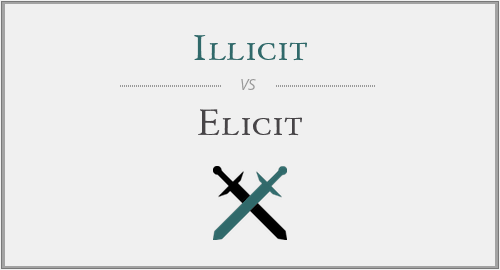The boss’s illicit association with his secretary elicited for a solution in order to retain the healthy office environment.
Illicit and elicit have very close spellings and pronunciation with each other which makes them homophones, but their meanings are origins are entirely different. Young writers and beginners of English writing often confuse these two words for each other as they are not very commonly used and have similar spellings. Today, we will help you understand the difference between the two words along with some examples so you don’t mistakenly use elicit when you are supposed to use illicit or vice versa.
Origin:
Elicit originated in mid-17th century from Latin elicit- ‘drawn out by trickery or magic’, from the verb elicere, from e- (variant of ex- ) ‘out’ + lacere ‘entice, deceive’. Illicit originated in early 16th century from French, or from Latin illicitus, from in- ‘not’ + licitus- ‘lawful or not forbidden’.
Elicit as verb:
Elicit is used as a verb in English language where it means to evoke or draw out (a reaction, answer, or fact) from someone. With synonyms like obtain, bring out, draw out, extract, evoke, bring about, bring forth, induce, excite and give rise to etc. it also means call forth (emotions, feelings, and responses). I tried to elicit a smile from Joanna. An old and archaic meaning of elicit is to draw forth (something that is latent or potential) into existence.
A corrupt heart elicits in an hour all that is bad in us.
Illicit as adjective:
The only form in which illicit is used in English language is as an adjective. When describing something which is forbidden by law, rules, or custom, we use the word illicit. The child was carrying illicit drugs. With synonyms like illegal, unlawful, illegitimate and prohibited etc. illicit can also be defined as something that is contrary to accepted morality (especially sexual morality) or convention.
His wife was involved in an illicit love affair.

Examples:
Good incentives can elicit greater effort. (New York Times)
Psilocybin would be infused into their bloodstreams before a psychotherapy session, tailored to elicit positive memories. (Independent)
For the curious souls who fall prey to dark influence and illicit highs, it’s easy to get mixed up in a worrying subculture. (Irish Times)
The U.S. also wants Burma to open up to U.N. nuclear inspectors and sever illicit military ties with North Korea. (Sydney Morning Herald)
Elicit or illicit:
Illicit is an adjective that means illegal. Elicit is a verb that means evoke. If the word you are using is an adjective, you probably mean illicit. Elicit is never an adjective. If you are trying to use the word as a verb, you should use elicit. Much in the same way elicit is never an adjective, illicit is never a verb. You can remember the difference between these words by remembering their synonyms. Both illicit and illegal begin with the letter I, and both elicit and evoke begin with the letter E.
Did this article elicit a conceptual awakening in you?




Have a discussion about this article with the community:
Report Comment
We're doing our best to make sure our content is useful, accurate and safe.
If by any chance you spot an inappropriate comment while navigating through our website please use this form to let us know, and we'll take care of it shortly.
Attachment
You need to be logged in to favorite.
Log In